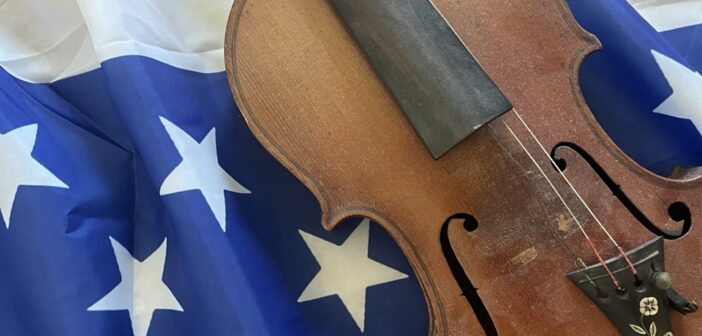By Sophia Sullivan, Editor-in-Chief
For as long as the United States has been a country (and, even before that), politics have intertwined with music as a means of expression, persuasion, and awareness.
All the way from the very beginnings of the country, Americans saw music as a way to express their growing frustrations with England during the Revolutionary War (1775-1783).
“The use of music for wartime and for political persuasion is very old,” said Cynthia Selph, Associate Professor of Music at Saint Leo University.
Broadsides, typically anonymous single-page papers that often served as posters, were instrumental in the spread of political commentary and information. “The Liberty Song,” one of the very first American tunes and the American National Anthem for some of history, was originally printed and distributed on a broadside during the Revolutionary War.
Furthermore, the popular Patriot song, “Yankee Doodle,” was originally a British song that they used to poke fun of the rag-tag Patriot military, “Yankee” being a term used to mock the colonists, and “doodle” a term used for a country hick. But, once the Americans began collecting victories in the war, they adopted the song to throw it right back in the face of the British.
When the British surrendered at the Battle of Yorktown in 1781, General George Washintonordered the Fife and Drum Corps to play “Yankee Doodle” as they signed the treaty. As the British gave up power of the colonists, the Yankees performed a song initially used to make fun of themselves—talk about a powerful message!
The Fife and Drum Corp was still present by the time the Civil War (1861-1865) rolled around. Songs like “Battle Hymn of the Republic” were a symbol of the Union during the war, while “Dixie” was a sort of anthem for the Confederacy.
Presidential use of music is another historical practice, which continues to this day.
“John Adams was the first president that had the President’s Own Marine Band,” noted Selph. To this day, every single president has this band play at their inauguration ceremony. The kind of music presidents choose to play at their inaugurations can be extremely telling of who they are as a person, said Selph.
In recent years, Obama exemplified this concept when he had a new musical piece written for his inauguration titled “Air and Simple Gifts” by the famous composer John Williams.
“For example, Obama chose to have a new piece written, Air and Simple Gifts, for his inauguration, because that is an original American Shaker tune,” said Selph. “That meant something to him, representing the authenticity of the American spirit.”
In 1961, the Kennedys broke barriers when they had the first Black soloist perform in the White House, Grace Busby.
“The Obamas had a real Renaissance, because they did the White House concerts on a very regular basis, and they tended to focus on black artists and only American songwriters,” noted Selph.
According to Selph, presidents have been well-known for using music as a “political tool.”
“Pay attention to the music they play,” encouraged Selph. For example, George W. Bush loved playing country music at his rallies and used that to connect with the American people.
“Country music came to symbolize a certain aspect of patriotism,” said Selph.
Famous feuds in the country music community have often caused upheaval in the American political climate, such as The Chicks (formally The Dixie Chicks) and Toby Keith in 2003. When Natlie Maines commented on Keith’s song “Courtesy of the Red, White, and Blue (The Angry American),” citing it as insensitive, The Chicks virtually became blacklisted in the genre.
Blacklisting musicians is not a foreign concept in the United States.
“You might be surprised to know that folk musicians were the number one blacklisted musicians,” said Selph. Many folk bands and musicians were perceived as communists based on their views and lyrics. The Weavers lost their record deal, and Pete Seeger couldn’t even perform publicly for a 20-year period in the 1950s to 70s, Selph noted.
Today, music is widely available to everyone with the rise of streaming platforms over radio or CDs. It is virtually inescapable in such a digital age, which, like most things, comes with good and bad.
“It does make things more ubiquitous, but it also splits us into tinier pieces,” said Selph.
People now have more access to music than ever before, which also allows them to create their own little world of media they prefer to consume.
“We have very little music that is universally recognized by just about every single person in the United States,” said Selph.
In the past, events like the March on Washington (1963) brought thousands of people together and they shared the powerful experience of singing “We Shall Overcome” led by Joan Baez.
The same is true after the Iraq War, when Toby Keith released “The Angry American.”
“That just brought out all of that emotion everybody in America felt, said Selph.” “That song became, regardless of what you felt about the Iraq War, the symbol of Americans feeling the gasp of what happened.”
And that is what music does—it is the great container of the human experience, emotions, and endurance that everyone can gain access to. In a way that literature and other media cannot, music creates an atmosphere and space for connection, even across the board of the often-chaotic American political scene.
“Music makes a direct emotional connection with people and it’s immediate, it’s visceral, and it’s memorable.”
Through time, division, and unification, music continues to serve as a timeless vessel for American political thoughts and feelings. Next time you hear the jovial tune of Yankee Doodle Dandy, or stumble across the lyrics of an old folk song, think about the origins and implications of the music you’re listening to. As the United States political landscape continues to unfold and evolve, remember the power of music to connect, feel, and capture moments like nothing else can.





